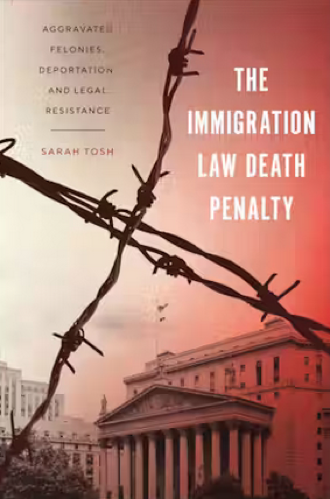The Immigration Law Death Penalty
Breve Descripción
Rastrea el papel del delito grave en el régimen de deportación actual.
En los tribunales de inmigración de todo Estados Unidos, un no ciudadano condenado por un “delito grave” casi con certeza enfrentará la deportación sin acceso al asilo. Sin embargo, a pesar del nombre que suena siniestro, los delitos graves no tienen por qué ser "agravados" ni "delitos graves". El término abarca más de treinta delitos, que van desde fraude con cheques y hurto en tiendas hasta la presentación de una declaración de impuestos falsa. La reciente ampliación de la lista de esos delitos ha dado lugar a tasas astronómicas de deportación.
Breve descrição
Traça o papel do crime no atual regime de deportação. Nos tribunais de imigração dos Estados Unidos, um não-cidadão condenado por um “crime” irá quase certamente enfrentar a deportação sem acesso a asilo. No entanto, apesar do nome ameaçador, os crimes não precisam ser “agravados” ou “crimes graves”. O termo abrange mais de trinta crimes, desde fraude em cheques e furtos em lojas até a apresentação de declarações fiscais falsas. A recente expansão da lista de tais crimes levou a taxas astronómicas de deportação.
Full description
Traces the role of the aggravated felony in today’s deportation regime
In immigration courts across America, a non-citizen convicted of an “aggravated felony” will almost certainly face deportation with no access to asylum. However, despite the ominous-sounding name, aggravated felonies need not be either “aggravated” or “felonies.” The term encompasses more than thirty offenses, ranging from check fraud and shoplifting to filing a false tax return. The recent expansion in the list of such offenses has resulted in astronomical rates of deportation.
This book chronicles the rise of the use of the aggravated felony, known by lawyers as the “immigration law death penalty,” to criminalize and then deport immigrants. Immigrants convicted of aggravated felonies are subject to mandatory detention and almost certain deportation—and are ineligible for almost all forms of legal relief from removal. Furthermore, immigrants convicted of aggravated felonies can be detained for months or even years without bond, are not guaranteed lawyers, and can even be deported without an opportunity to plead their case in court. Sarah Tosh provides the first in-depth understanding of how aggravated felonies have been used to deport thousands of documented and undocumented immigrants and how the severe, expansive, and racially disparate outcomes have been met with innovative legal responses, bolstered by networks of community-based resistance. The Immigration Law Death Penalty is an urgent read for anyone committed to protecting the rights of immigrants nationwide.
Technical Professional & Applied Sciences
otras áreas de / interés...
other areas of / interest...
outras áreas de interesse...
¿Buscas un título en un área específica?
¿Buscas un título en un área específica?
¿Procurando livros em uma área específica?














